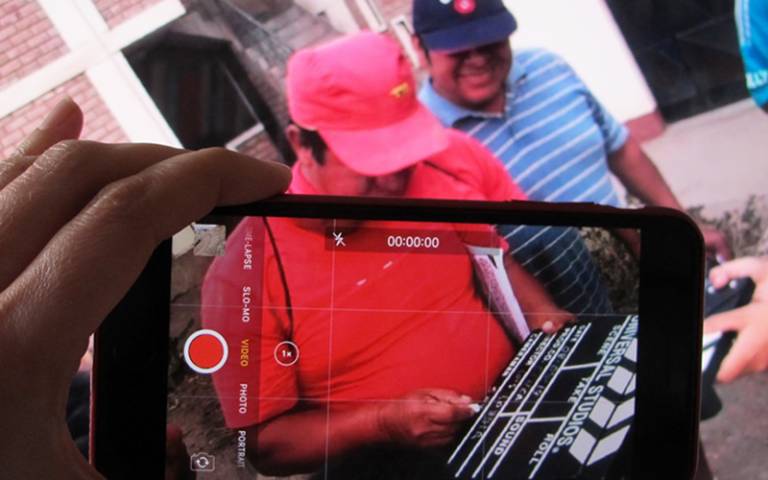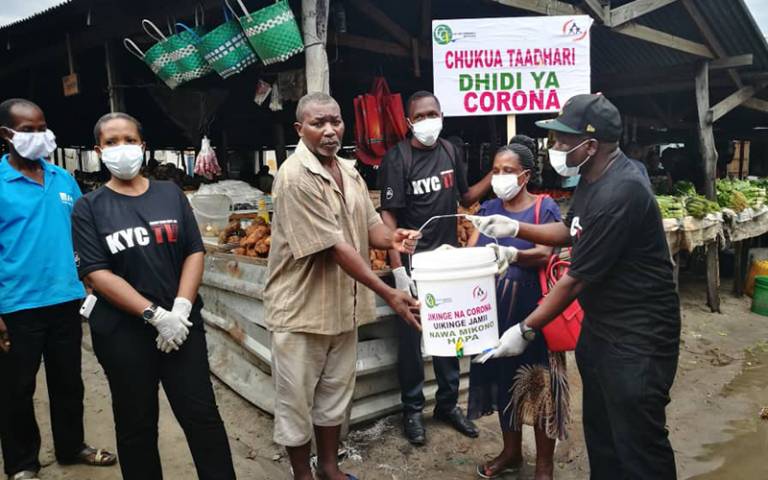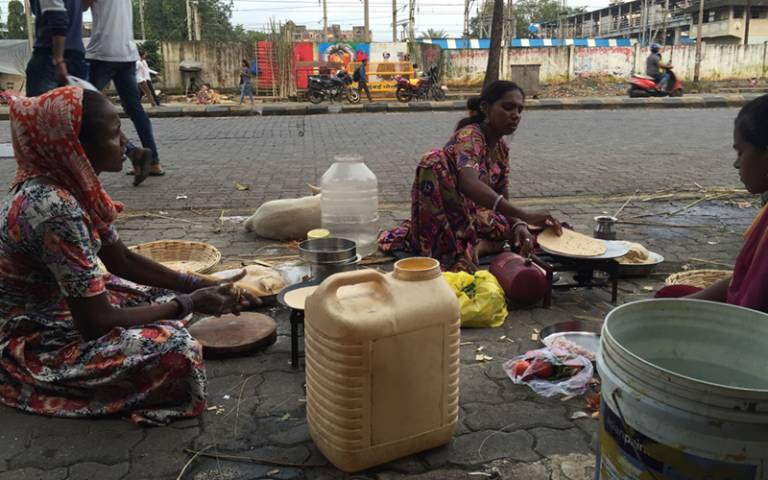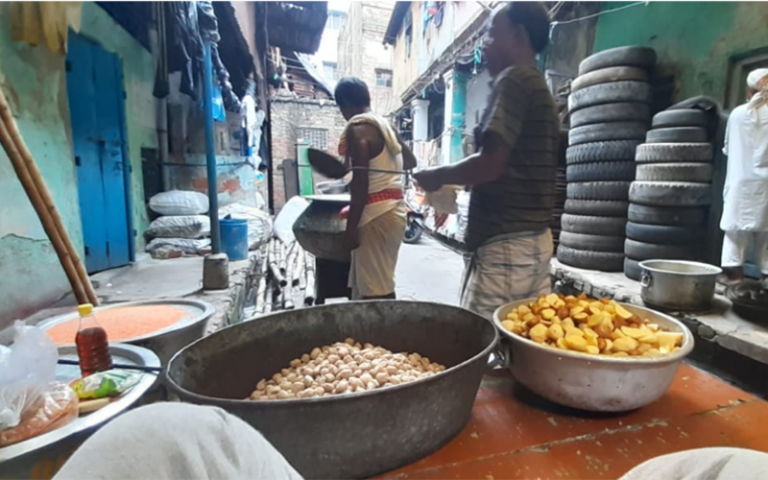Winning proposals of the DPU Internal post-COVID research call announced
19 April 2021
We are delighted to announce the five successful proposals to receive a total of £50,000 for research activities that focus on the pandemic and its (likely) impact on partners, cities and countries in the Global South

The call aims to support the maintenance or development of relationships with Global South partners specifically which, in some cases, have been undermined by pandemic restrictions.
The theme was deliberately broad, with proposals required to make a contribution to the development of a programme of research that is relevant to DPU’s Vision and Principles, with a preference given to proposals that materially further the research of early career researchers. Preference was also given to proposals that provide funding for the development of proposals or consolidation of partnerships that support future research funding applications to external funders.
Below are brief outlines of each of the succesful proposals.
- Impact of Covid-19 on the work of The Centre for Community Initiatives in Tanzania and the communities it works with
PI: Prof Cassidy Johnson & Dr Emmanuel Osuteye
Co-I and partners: Tim Ndezi (Centre for Community Initiatives) in TanzaniaThe Centre for Community Initiatives (CCI) in Tanzania is an NGO that supports that Tanzanian Federation of the Urban Poor. CCI is a long-standing partner of the DPU, having hosted MSc field trips and participated in several research projects, including the Knowledge in Action for Urban Equality (KNOW) programme. During the early days of the pandemic, CCI developed a campaign to fill knowledge gaps about COVID-19 and raise awareness about prevention in informal settlements in Tanzania.
In a KNOW blog post, they outline how informal settlements in cities of Tanzania have relied, during the pandemic, on local community organisations to mobilise and bridge the deficits in information and in the provision of essential aid. Emmanuel Osuteye and Cassidy Johnson have been awarded a DPU Internal Research funding to work with CCI and its Director, Tim Ndezi to understand more about the impacts of COVID-19 on this local NGO, as well as the impacts of COVID-19 as an emerging risk in informal settlements
The current research funding will enable field work to assess the impacts, and also enable the team to focus in on important questions emerging for future research in this field. To date, there has been very little work done that looks at these issues in Tanzania.
- Interrogating ‘unsafety’: a comparative action-research on COVID-19 governance and exacerbation of everyday insecurities of houseless populations in Indian cities
PI: Dr Paroj Banerjee
Co-I and partners: Dr Ratoola Kundu (TISS) and civil society partner Mr Brijesh AryaThe DPU Internal Grant will support Paroj Banerjee’s project titled ‘Interrogating ‘unsafety’: a comparative action-research on COVID-19 governance and exacerbation of everyday insecurities of houseless populations in Indian cities’.
Located in the cities of Kolkata and Delhi, in collaboration with academic partner Dr Ratoola Kundu, Assistant Professor at the Tata Institute of Social Sciences (TISS) and civil society partner Mr Brijesh Arya, this research will advance existing action-research in Mumbai to examine how official measures related to Covid-19 negatively impacted houseless groups. Divergent to the dominant ideas of home which is not only seen as a safe haven but also a physical structure tied to a specific consumer consciousness, there has been alarming evidence to suggest that Covid-19 pandemic has exacerbated atrocities in relation to home. As the ‘home’ was seen as an important site to shield from the virus, those inhabiting the streets were perceived as contaminators and several measures were introduced to confine these groups physically, economically, socially and politically.
Mandatory physical confinements within the home have not only presented the ‘sacred’ sphere as oppressive for many (UN Women has termed this as ‘shadow pandemic),but have failed to provide protection to the houseless. On the contrary the pandemic has compounded intersectional vulnerabilities of houseless populations as they were perceived as contaminators to the ‘housed’ public. Measures taken by national and local governments in Indian cities to contain the spread meant confining these street dwellers and rough sleepers into packed spaces negatively impacting their livelihoods, social networks, and physical safety. The proposed project will advance the existing work in Mumbai by strengthening the dissemination and policy advocacy, but also be extended to the cities of Kolkata and Delhi to gain a comparative perspective of institutional and everyday conditions that pushed houseless groups to a situation of ‘unsafety’.
By unsafety, this project is alluding towards the embodied forms of social, economic, cultural, psychological, and physical precarities generated through concerns and practices of institutionalised protection. The action research aims to address urban marginalisation that were produced as effect of imbibing inequitable notions of safety.
- Remote documentaries and collective narrative construction in post-COVID research
P-I: Dr Rita Lambert
Co-I and partners: Dr Ignacia Ossul-Vermehren and Alex Macfalane (DPU) and Arq. Carlos Escalante Estrada from Peruvian NGO CENCA and Ahmad Rifai from Indonesian NGO Kota KitaCOVID-19 has increased the uptake of digital technologies by informal dwellers with the possibility of producing ‘cellphilms’ and ‘digital stories’ that can be harnessed for strategic ends. At the same time, for researchers and practitioners alike, the pandemic has hastened the experimentation with remote visual methodologies, but without the critical consideration of how these methodologies might recreate or exasperate extractive approaches. The pressure to find ways to study context without physical presence means that researchers revert to the disembodied gaze provided by the camera and transfer textual and visual material that can be analysed and repackaged elsewhere.
Calls for co-production of knowledge are all too good to counteract some of these problems. However, co-production relies heavily on being in the context, working with people and being able to collaborate. Questions around how we support communities to devise strategies for self-representation, how we enact co-production remotely and how we conduct ethical research are more urgent than ever at this time and beyond the pandemic.
This research seeks to advance collective narrative construction through remote documentaries. It will examine the contextual and situated ethics of visual material and different documentary styles together with inhabitants. By doing so, it aims to develop an ethical and practical framework for working remotely on visual outputs produced by urban dwellers in low-income neighbourhoods. The activities proposed include a series of workshops with experts and practitioners, online training sessions in storyboarding and video-making, and the production, screening and evaluation of two documentary films. The films will focus on collective action generated in the light of COVID, with the precise angle chosen by participants. The project is led by Dr Rita Lambert with co-investigators, Dr Ignacia Ossul-Vermehren and Alex Macfalane from the DPU; Arq. Carlos Escalante Estrada from Peruvian NGO CENCA and Ahmad Rifai from Indonesian NGO Kota Kita.
- Politics of Care in the Pandemic Time: Investigating Infrastructure of Solidarity Networks
P-I: Dr Raktim Ray
CO-I and partners: Amit Chatterjee, School of Planning and Architecture BhopalImage Credit: Quarantined Student-Youth Network
The research aims to examine how civil society mobilises resources through solidarity networks to provide care. To do so, it explores comparatively how civil society self-mobilised during Covid-19 outbreak in London and Kolkata and offered various forms of services to vulnerable communities. These services are not only limited to arranging grocery or medications for shielding communities (in London) but also organising community kitchens and providing food for economically marginalised sections (in Kolkata).
This ethnographic research draws examples from Covid-19 Mutual Aid Group in London and Quarantined Student - Youth Network (QSYN) in Kolkata to decipher how politics of care is operationalised through solidarity networks. By a nuanced understanding of their resource mobilisation strategies, the research also aims to reconceptualise the understanding of infrastructure.The project will publish collaborative blogs based on lived experiences of people who were involved with these solidarity networks. The project will also curate a 3-part vernacular podcast series on politics of care.
- Covid-19, Infrastructural Development and the Biogeopolitics of Everyday Life in Berbera, Somaliland
P-I: Dr Giorgio Talocci
CO-I and partners: Dr. Amina-Bahja Ekman, Redsea Cultural Foundation (RCF)The coastal city of Berbera is an increasingly prominent node for both understanding and shaping the geopolitical and socio-cultural future of Somaliland. It will possibly rival, in the longer term, the capital Hargeysa in terms of political and economic centrality. The city is experiencing high demographic growth, occurring in absence of a plan for the city’s expansion, and of a clear housing policy.
These uncertainties and the abrupt transformation of the city’s socio-spatial fabric are putting Berbera’s tangible and intangible forms of heritage under threat, with the current pandemic having added further complexity to such picture. In such context, our main partner in the present research initiative, the Redsea Cultural Foundation (RCF), is establishing the Berbera Cultural Centre, with the support of a series of local and international actors.
This research proposal aims to enhance RCF’s agency and research capacity in Berbera, through a research training programme and the parallel construction of a geo-referenced database – an online collaborative spatial platform that will serve as basis for upcoming research of wider scope and/or targeting a wider scale. Embracing a biogeopolitical perspective, the research wants to overlap urban-health-related concerns and insights to the study of dynamics of socio-spatial exclusion, as shaped by local and international forces. We ask: What dynamics of socio-spatial exclusion emerge (where, and by/toward whom)? To what extent has the Covid-19 outbreak contributed to exacerbate such dynamics?
Photo:
Participatory video workshop with inhabitants in Lima organised by CENCA
Photo Credit: CENCA/Rita Lambert
 Close
Close

